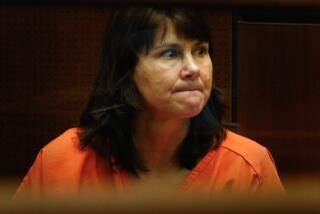Parole Voted for Ex-Black Panther Johnny Spain
- Share via
VACAVILLE, Calif. — Under pressure from a federal judge, a divided state parole panel Thursday ordered the release of former Black Panther Johnny Spain, the only person convicted of murder in a bloody 1971 San Quentin prison riot that left three inmates and three guards dead.
The panel voted 2 to 1 that Spain should be freed within two years, with the specific parole date determined by Spain’s prison behavior. He could be free as early as 16 months from Thursday.
However, the case of the 38-year-old former revolutionary is far from over. The full nine-member Board of Prison Terms will review Thursday’s decision within two months and can overturn it.
Spain said after the vote that he doubts he will be released soon. Calling it a “brilliant way to comply with the federal court order,” he said he believes the full panel will reject his release, though his lawyer, Dennis Riordan, plans to appear in court in Los Angeles as early as today to seek his immediate release.
Even as they voted to allow his release, panel members complained that they had no choice because of an order last week by U.S. District Judge Thelton Henderson. Henderson directed the board not to consider Spain’s conviction of murder in the 1971 deaths of San Quentin guards Frank DeLeon and Jere Graham in their parole decision.
Henderson issued the unusual order because, in a separate proceeding last year, he overturned Spain’s conviction in the San Quentin case. Henderson ruled that Spain was denied a fair trial because he was chained during the 203-day trial in Marin County.
The state attorney general’s appeal of Henderson’s ruling for a new trial is pending before the U.S. 9th Circuit Court of Appeals.
“I regret I have to follow that (order,)” panel member Albert Leddy said in voting for Spain’s release.
Leddy, not trying to conceal his displeasure with Henderson’s order, added that the judge’s ruling that he not consider the San Quentin riot as a mark against Spain forced the panel to treat Spain as if he were “an ordinary criminal.”
Spain remains imprisoned for his original crime--a 1966 murder during a street robbery in Los Angeles when he was 17.
“You ring phony to me. I frankly do not believe you,” dissenting panel member Donald Rudloff told Spain, disputing Spain’s claims that he has reformed and is remorseful about the 1966 crime.
Rudloff, voting to keep Spain behind bars indefinitely, called the 1966 murder “callous, cold and calculating.”’
Still, the case is unusual in part because of the surprising support that Spain has received from prison guards and staff, as well as prison psychologists who have issued glowing reports about him.
“Anybody who reads this and passes it off as liberal limp-wristedness is just not seeing,” Riordan said, holding up a thick packet of 94 letters of support, plus another volume of supporting letters.
Once in prison, Spain became a radical and befriended George Jackson, the Black Panther who started the San Quentin riot by pulling a gun on guards on Aug. 21, 1971. Three guards and three inmates were killed. Among the fatalities was Jackson, who was gunned down in what prosecutors say was a foiled escape.
Spain was the only one convicted of murder in the so-called San Quentin Six trial that ended in 1976. He was not accused of actually killing the guards, but rather of being criminally liable for the deaths because he participated in Jackson’s attempted escape that led to the deaths.
More to Read
Sign up for Essential California
The most important California stories and recommendations in your inbox every morning.
You may occasionally receive promotional content from the Los Angeles Times.










